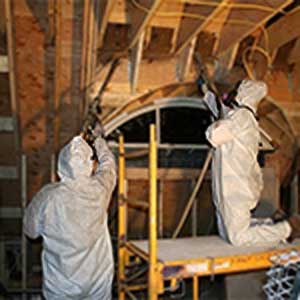We are here for you all day and night. Help is always close by, especially during serious fires and floods.

Our team has worked on both homes and businesses. We are skilled at handling projects, big or small.

We fix your property after problems like water damage and fire & smoke damage. We also clean air ducts and handle biohazard cleanup. We aim to return your property to how it was before the disaster.
How to Extinguish a Grease Fire
Across the United States, a home fire happens every seven seconds. The NFPA says unattended cooking causes most home cooking fires and injuries, which can lead to significant damage.
While heating the grease on the stovetop to cook your favorite vegetables, the doorbell rings. You step out of the kitchen to see who is at the door. Sadly, the grease gets too hot and begins to smoke, and when you return, it’s on fire! The first thing you do to stop the fire can help or worsen things. Knowing how kitchen ingredients can help extinguish a grease fire, practicing safety by removing moisture from ingredients for grease fires and keeping flammable items at a safe distance is very important.
Across the United States, home fires happen every seven seconds. The NFPA says unattended cooking is the main cause of fires and injuries. We will share a few safety tips to stop this from happening at your home. These tips are about how to put out a grease fire on the stove and what to do during a grease fire.
What is a grease fire? How do Grease Fires Start? Causes of Grease Fires?
If you cook with grease, like oils or butter, be careful. If your stove gets too hot, or near open flames, you might start an oil fire. Grease becomes dangerous when it reaches its smoke point at high temperatures. Vegetable oils begin to smoke at about 450°F. Meanwhile, animal fats, like lard or goose fat, will start to smoke at 375°F.
It’s essential to know that when you heat oils, they can boil and then smoke. If they get hot enough, they might catch fire. Vegetable oils smoke at about 450°F. Animal fats, at 375°F. Hot grease can catch fire, causing severe kitchen fires.
Remember These Tips on How to Stop a Grease Fire
You must first turn off the heat source to extinguish a small grease fire. Next, cover the flames with a lid or baking sheet. Do not use water. A fire extinguisher should only be used as a last resort if you have no other options. If the situation worsens, call for emergency services and evacuate the premises right away, and wait for firefighters to arrive. Here are the steps to safely put out a grease fire:
- Turn off the heat immediately if you smell oil or see smoke from the burner, stove, or grill. These are heat sources.
- Keep a lid near the counter. A metal or non-glass lid can help cover the flames if a fire starts. You can also close the lid to extinguish a fire in the oven.
- Keep baking soda and salt where you can reach them easily. If you cannot cover the fire, use salt or baking soda to cut off the air it needs to burn. Baking soda works well on fires.
- If you have a Class K extinguisher, use it for a grease fire. This is the best way to fight the fire.
What you should not do in case of a grease fire…
- Don’t leave the pot or pan alone, especially if it has grease. This is very important for safety in the kitchen.
- Don’t move the pan or pot while the oil burns to prevent the spread.
- NEVER use flour, baking powder, or sugar, as they are combustible materials. They can do even more damage rather than help smother the fire.
- Contact your local fire department via 911 as soon as you’re safe and if you cannot handle the situation.
Grease Fire Prevention Tips
- Don’t leave the pot/pan unattended, especially if it has grease. This is key for kitchen safety.
- Be awake and aware when you cook in the kitchen.
- Keep things that can catch fire, like paper towels, potholders, or wood, away from the counters.
- Always clean up any oily spills and dirt on your burners and counters.
- A thermometer can help keep Tab of the oil temperature. Know your cooking oils’ flash point and ignition temperature to avoid fires.
- Thaw frozen food and dry it well before adding it to hot oil. Add the food gently to reduce oil splatters.
- Turn off the heat immediately if the oil gets too hot and starts to smoke.
- Don’t wear oversized clothes or loose sleeves. If your clothes catch fire, do these three things: STOP, DROP, and ROLL. This can reduce burn injuries.
- Put a fire extinguisher in your kitchen where you can reach it easily. Make sure it is a type meant for grease fires. Call 911 if there is an emergency.
- Keep children outside the kitchen when you are cooking.
Call Fire and Smoke Damage Restoration Professionals
Have you had a grease fire in your kitchen that damaged your home? Superior Flood and Fire can help you after cooking fires. After you put out the grease fire, a fire damage restoration company will help restore your home, addressing any soot left behind.
Contact us at Water Damage San Jacinto to start a quick and safe cleanup of your home today! We are always here for you, 24 hours a day, 7 days a week.
We also offer emergency water damage restoration and mold remediation services.



